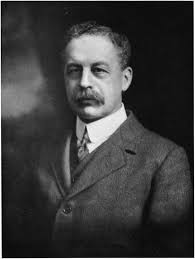Mackinder, Halford J. (1861–1947)
HALFORD JOHN MACKINDER was born on February 15, 1861, in Gainsborough, a small port and market town at the river Trent in England. He was the eldest of six children born to Dr. Draper and Mrs. Fanny Anne Mackinder. His father was well educated and trained as a scientist. It was he who taught Mackinder to look for “interrelationships between factors in the environment.” In 1870, he went to Gainsborough Grammar School and from 1874 he was educated at Epsom College. His father always wanted him to be a doctor, and Epsom had a sound reputation for its advanced training in the sciences. At school Mackinder showed strengths in essay writing, languages, public speeches, and environmental sciences. Furthermore, he developed an enthusiasm for historical geology. In 1880 he and his friend Thomas Walker won a five-year Junior Studentship in physical sciences and in October of the same year the two men went up to Oxford and entered Christ Church school. Here, Mackinder specialized in animal morphology, but he also took courses in physics, chemistry, physiology, and botany. During his last two years he attended classes in geology, history, and law.

At the university he was involved in a wide range of school-related activities. He spent a lot of time in the laboratories and the University Museum. He joined the Union and helped found the Junior Scientific Club in 1882. In the same year he enlisted in the Oxford University Army Volunteer Reserve. During the summer vacations, he often took part in exercises and long marches across the countryside. Another interest related to the military was his affinity for war games and his membership in the Kriegsspiel Club. There he met many other people who later would be of importance to him. Among those at Oxford was Herford George, who taught military history. He wrote on the relationship of history and geography and on the historical geography of the British Empire. And it was George who later proposed Mackinder for membership in the Royal Geographical Society in 1886.
In a paper entitled “The Scope and Methods of Geography” that he wrote for the Royal Geographical Society, Mackinder outlined his ideas of a “New Geography.” He defined geography as “the science of distributions” based on a biological tradition in which forces interconnect and play upon each other. As a result of the paper, Mackinder is sometimes labeled as an environmental determinist. It was his conviction that physical and human geography formed one subject, and he consequently drew the conclusion that history and geography can never be studied separately. In addition to his educational work, Mackinder also planned the first ascent of Mount Kenya. In 1896, the same year the Uganda Railway started, Mackinder received permission for the expedition to Kenya. In Kenya, the group had to face many problems, such as an outbreak of smallpox and a famine. Nevertheless the expedition to East Africa turned out to be a great success.
In 1904, he presented his well-known paper “Geographical Pivot of History” at the Royal Geographical Society. He wrote that “my aim will be to exhibit human history as part of the life of the world organism.” Moreover, he argued that sea power was declining relative to land power, and railroads led the way to continental areas. His thesis, widely known as Mackinder's Heartland Theory, suggests that there was a pivotal area “in the closed heartland of Euro-Asia,” which was most likely to become the seat of world power because of its inaccessibility. His theory was more or less a model based on world history and geographical facts. Mackinder defined a “world island” that consisted of the two continents Eurasia and Africa. He saw history as a struggle between land-based and sea-based powers. He saw that the world had become a closed system, with no new lands left for the Europeans powers to discover, to conquer, and to fight over without affecting events elsewhere.
Sea- and land-based powers would then struggle for dominance of the world, and the victor would be in a position to set up a world empire. The determining factor in this struggle was geography. The world, he argued, was now a closed political system and a worldview had to be taken.
Mackinder's geographical work was often criticized as being too political, and his scientific reasoning was often accused of being too primitive. In brilliant lectures he expounded the principles of the “new” geography by synthesizing the study of the physical landscape and human activity within a historical context. According to Mackinder there are three correlated arts that he thought were characteristic of geography: observation, cartography, and teaching. Mackinder always pushed for the founding of a geographical institute in London, and in 1893 he became involved in the founding of the Geographical Association to stress the necessity of teaching geography in schools. Mackinder's contribution to the founding of Reading University is considered one of his most important achievements.
Finally, Mackinder was convinced that geography was a distinct discipline with its own methodology, thus deserving its own place within the academic world.